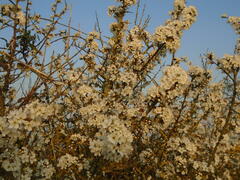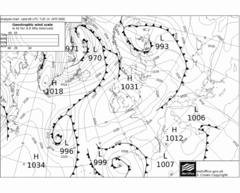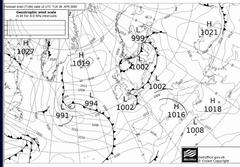The weather for sailors is notoriously unpredictable, but one of the more regular occurrences in the (technically) chaotic meteorological cycle is the one we are experiencing at the moment, known as ‘blackthorn winter’, from the hedgerow plant which produces the sloes for that most magical of (actual) winter drinks...
Of the blackthorn winter winds, the one we are most cautious of in Weymouth is the often strong and prolonged north-easterly aggravated by the presence of an adjacent low pressure system to the south which can squeeze the isobars and increase the wind strength considerably over the forecast with little if any barometric or other indication. In the right conditions, though, this can be a great wind for an early season Channel crossing, if a little chilly!
This phenomenon usually occurs around the time we are launching boats, and has in the past been the cause of the two worst north-easterlies in recent times, the latter of which caused considerable damage to boats on the lower moorings – both occurred on the last weekend of April. Because the clear weather induces a thermal effect which can reduce the wind strength during the day, the strongest wind is usually in the early hours of the morning as well!
Blackthorn winter is well known to farmers and gardeners as the period which regularly follows the unruliness of early Spring with cold dry weather and easterly sector winds. On the farm where I worked for some years in north Dorset, where the soil was a heavy clay lying on top of Forest Marble, the kitchen garden needed to be manured and dug beforehand, to let the cold weather get at the leatherjackets, and then left until warmer moist weather made it friable. The latest snow we had there was on April 26th!
As soon as the blackthorn (prunus spinosa) begins to flower, and high pressure moves in to warm itself over the British land-mass, the wind shifts into the east and is not to be trusted until the anticyclone moves off, usually to be replaced with the more usual pattern of warmer and wetter weather – a shift which Chaucer was perhaps referring to in the opening lines of his ‘Canterbury Tales’:
‘Whan that Aprille with his shoures sote (sweet)
The droghte of Marche hath perced to the rote...’
UPDATE 26 April - Chaucer's showers are forecast finally for next week - tonight the wind should go SW for the first time in 6 weeks.
Steve Fraser
Submitted on 14th April 2020



